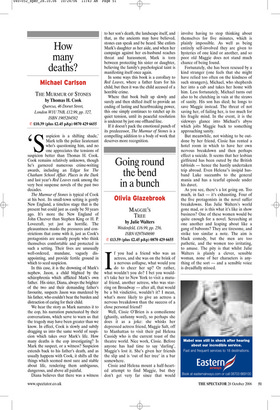How many deaths?
Michael Carlson
THE MURMUR OF STONES by Thomas H. Cook Quercus, 46 Dorset Street, London W1U 7NB, £12.99, pp. 327, ISBN 1905204582 ✆ £10.39 (plus £2.45 p&p) 0870 429 6655 ‘Suspicion is a shifting shade,’ Mark tells the police lieutenant who’s questioning him, and no one appreciates the tensions of suspicion better than Thomas H. Cook. Cook remains relatively unknown, though he’s garnered numerous crime-writing awards, including an Edgar for The Chatham School Affair. Places in the Dark and last year’s Red Leaves rank among the very best suspense novels of the past two decades.
The Murmur of Stones is typical of Cook at his best. Its small-town setting is gently New England, a timeless stage that is the present but could just as easily be 50 years ago. It’s more the New England of John Cheever than Stephen King or H. P. Lovecraft, yet just as horrific. The pleasantness masks the pressures and constrictions that come with it, just as Cook’s protagonists are usually people who think themselves comfortable and protected in such a setting. Their lives are unusually well-ordered, mundane, vaguely disappointing, and provide fertile ground in which to seed suspicion.
In this case, it is the drowning of Mark’s nephew, Jason, a child blighted by the schizophrenia which afflicted Mark’s own father. His sister, Diana, always the brighter of the two and their demanding father’s favourite, suspects Jason was murdered by his father, who couldn’t bear the burden and distraction of caring for their child.
We hear the story as Mark narrates it to the cop, his narration punctuated by their conversations, which serve to warn us that the tragedy may have been greater than we know. In effect, Cook is slowly and subtly dragging us into the same world of suspicion which takes over Mark’s life. How many deaths is the cop investigating? Is Mark the suspect, or a witness? Suspicion extends back to his father’s death, and as usually happens with Cook, it shifts all the things which seemed most sure and stable about life, rendering them ambiguous, dangerous, and above all painful.
Diana believes that there was a witness to her son’s death, the landscape itself, and that, as the ancients may have believed, stones can speak and be heard. She enlists Mark’s daughter as her aide, and when her campaign against her ex-husband reaches threat and harassment, Mark is torn between protecting his sister or daughter, believing the family’s psychological taint is manifesting itself once again.
In some ways this book is a corollary to Red Leaves, where a father fears for his child, but then it was the child accused of a horrible crime.
Where that book built up slowly and surely and then shifted itself to provide an ending of lasting and heartbreaking power, this one simply continues to ratchet up its quiet tension, until its peaceful resolution is undercut by just one offhand line.
If it doesn’t pack the emotional punch of its predecessor, The Murmur of Stones is a compelling addition to a body of work that deserves more recognition.


























































































 Previous page
Previous page